Pai Gow Tiles - Part 3 of 3 - Q & A
Pai Gow Tiles - Part 1 of 3 - Rules of the Game
Pai Gow Tiles - Part 2 of 3 - Pai Gow Strategy
Hi, I'm Mike Shackleford, also known as the Wizard of Odds, and this is part three on my series on Pai Gow. I'm joined by my friend, Heather Ferris, and videographer, and my favorite Pai Gow dealer in the whole world, Tess.
We already covered:
The important stuff the rules and strategy, in parts one and two, so this is going to be some more miscellaneous fun things that you may be wondering about the game.
Heather, do you have any questions for me?
[00:00:40] Heather Ferris: Thank you so much for explaining that, I really appreciate it. I have a question for Tess, no offense or anything.
Tess, when you were giving me those in the second video, you asked me to cut the deck. I was wondering, what are the different ways of cutting the deck, and maybe what are they called?
[00:00:59] Tess Dunn: Okay, Heather. Usually, when the customer is allowed to cut the deck, they can make three moves. It has to be kept to the three moves.
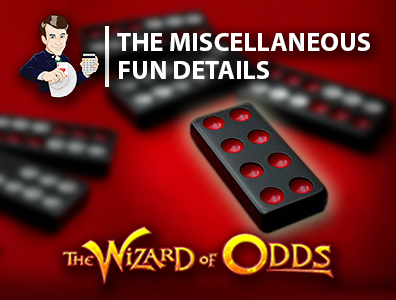
There are several ways they can go
The house way, and then [unintelligible 00:01:13] is the reverse house way, then you have [unintelligible 00:01:16], you have [unintelligible 00:01:20], you have [unintelligible 00:01:23], you have long-tail [unintelligible 00:01:27], which is a dragon head and phoenix tail, and then you have two ghosts knock on closed door.
[00:01:42] Mike: I've seen this one.
[00:01:43] Heather: I think that's my favorite one.
[00:01:45] Tess: Right? I like that one a lot. I'm sure there are more, but most houses only allow about five.
[00:01:53] Heather: Okay.
[00:01:53] Mike: Okay. One, I see a lot is the Hong Kong bank, sometimes called the Shanghai bank.
[00:01:59] Tess: Yes.
[00:01:59] Mike: Can you show us how to do that?
[00:02:00] Tess: Yes, I can.
[00:02:12] Mike: Nice. What about my favorite, one man, two women? How do you do that one?
[00:02:18] Tess: Like this.
[00:02:19] Mike: Is that supposed to look like a bed?
[00:02:20] Tess: Yes.
[00:02:22] Heather: Cool.
[00:02:24] Mike: This is the man on top of the two women, right?
[00:02:27] Tess: Yes, I believe that is correct, Mike, yes.
[00:02:28] Heather: [laughs]
[00:02:33] Mike: Okay. I'm sure there's others, but those are the main ones, right?
[00:02:38] Tess: Those are the main ones that most houses allow, yes.
[00:02:41] Mike: Yes. I've noticed that the Caesar's properties, there's actually a list on the table of which ones you can do.
[00:02:48] Tess: Wow.
[00:02:52] Mike: Angela, I hear you have a Pai Gow question for me.
[00:02:54] Angela: I have several Pai Gow questions for you. Can I get started?
[00:02:58] Mike: Yes, you may.
[00:02:59] Angela: Why is there no number four position on the table?
[00:03:02] Mike: Good question. In addition, there's no number 4 position in Baccarat, Pai Gow Poker, and other Asian games.
The reason is that in Chinese, the pronunciation of the word for four, Sì, sounds very much like the word for death. That's why, in Chinese culture, the number four is very unlucky, so that's why no one would dare sit at the number four spot.
[00:03:28] Angela: Very good reason not to have it then. [chuckles]
[00:03:30] Mike: Yes, very good reason. On the flip side of that coin, the number eight is considered a lucky number because it's very similar to the word for wealth.
[00:03:41] Angela: Works for me.
[00:03:44] Mike: Angela, you had another Pai Gow question for me.
[00:03:47] Angela: I did. I've heard about house way in Pai Gow, what does that mean? Does every casino have a different one, or is there just one house way?
[00:03:56] Mike: Yes. In Pai Gow, as well as Pai Gow Poker, the dealer has a certain strategy which can be very long and complicated, about how to set their cards or tiles.
In most situations…
…any casino would play it the same way. However, there's a number of borderline plays, that different casinos will play different ways, so every casino will have its own different house way that the dealers will be expected to memorize.
[00:04:24] Angela: Okay. That makes complete sense, that every casino would want to be able to have some autonomy.
[00:04:29] Mike: Yes, absolutely. There you have it. On my website, I had list about 10 different casino house ways for Pai Gow.
[00:04:38] Angela: Okay, I've memorized them all.
[laughter]
[00:04:40] Mike: Thanks, Angela.
[00:04:44] Angela: I have an etiquette question for you.
[00:04:46] Mike: Okay.
[00:04:47] Angela: If I'm understanding correctly, the house edge is lower if I take my turn to be the banker-
[00:04:53] Mike: That's right.
[00:04:54] Angela: - but I've noticed a lot of the other players don't like it if I take my turn to be banker. How would you handle that situation?
[00:05:00] Mike: Yes, this is a very common problem in Pai Gow. You're absolutely right, that the house advantage is significantly lower if you're banking, but also, other players, especially Asian players, don't like it when other people bank.
Especially:
if the table has been running hot. If you ask for your turn to bank, they may overtly say, "The table has been running good, don't mess it up by banking." Or they may be a little bit, not as aggressive about it, but say, "Things have been going good."
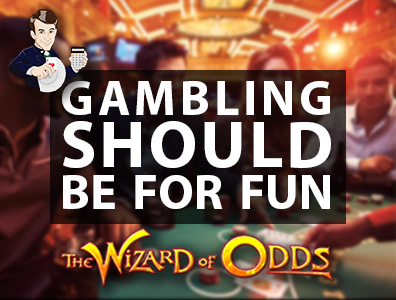
What do I do?
Although I preach on my website, all over the place, to fight for every 100th of a percentage point you can get off the house advantage, I also believe that gambling should be for fun, for entertainment, and I don't want to mess up the enjoyment for other players.
So, I may ask to bank, but if I sense that the other players don't want me to, I won't. I put etiquette above math.
[00:06:15] Angela: I like that, though. It's good to be considerate of the other players, especially when you're talking about what's probably a small difference.
[00:06:21] Mike: I'm glad you agree. Thanks, Angela, for the question.
[00:06:23] Angela: Of course.
[00:06:26] Mike: Do you have any more Pai Gow questions for me?
[00:06:28] Angela: Are there any side bets in Pai Gow?
[00:06:30] Mike: Side bets are one thing you don't often see in Pai Gow. They seem to have invaded every other casino game, but I've only seen a side bet in Pai Gow once. It's at the Palace Station.
I think it's called the Pair Fortunes, I have all the math for it on my website. I hear there's another one called the Crown Treasure at the Crown Casino in Melbourne, Australia.
Again
I have the math for that on my website. I've noticed, in playing at the Palace Station, you don't often see players betting that. I think that to play Pai Gow, to begin with, you have to be a pretty intelligent person, and maybe these people just know enough to not bet side bets.
[00:07:12] Angela: [chuckles] We all know what you think of side bets.
[00:07:14] Mike: Yes. What do I think of them?
[00:07:16] Angela: Sucker bets, don't play them.
[00:07:17] Mike: You're absolutely right. I've taught you well, my student.
[00:07:24] Angela: Mike, I'm wondering where I can go to play Pai Gow, because I've noticed it seems like there's less and less of it around Las Vegas.
[00:07:30] Mike: Yes, you're absolutely right. The number of tables here in Las Vegas keeps decreasing. The Mandalay Bay took it out, the Treasure Island took it out. Nevertheless, it still can be found up and down the Strip.
Going just off memory
It can be played at the MGM, the Paris, Harrah's, Venetian, Palazzo, I'm not sure about The Palazzo. The Wynn, maybe the Encore, Caesars Palace, and the Golden Dragon. I believe that's it. It's a lot easier to find on the East Coast. Foxwoods has a ton of tables.
I think every casino in Atlantic City has it, and I hear some of the casinos in Chicago has it. I think Harrah's, in Lake Tahoe, has it. There's a bunch of tables, surprisingly, at the Silver Legacy in Reno, the Peppermill has one, but surprisingly, it's really difficult to find in Macau.
It just doesn't go over there. I think it's more of a private game over there, not like when you would play against the dealer.
[00:08:42] Angela: A lot of things that we think of as typically Asian don't actually go over well in Asia, like wontons and egg rolls, so I guess it makes sense for the game too.
[00:08:50] Mike: Yes, absolutely. All the Chinese food I'm used to over here, I never see over there.
[00:08:54] Angela: No. [laughs]
[00:08:55] Mike: Yes. You would know, you used to live there.
[00:08:57] Angela: Yes, and I didn't eat much.
[laughter]
[00:08:59] Mike: All right. Thanks for the question, Angela.
[00:09:01] Angela: Of course. Mike, you're always talking about Pai Gow. Why do you like it so much?
[00:09:08] Mike: That is a good question. I must say that if the house advantage were the same in every game, Pai Gow would be my favorite game. It's a very challenging game, it involves a lot of strategy, I love the ambiance of the game.
It's a slow game, low volatility
I think it looks elegant to play it, I love touching the tiles and that sound of the tiles clinking against each other. I just like to be different. While everyone else is playing Poker or Blackjack, I want to be playing something that no one else seems to be playing.
[00:09:47] Angela: [chuckles] Or riding a unicycle.
[00:09:48] Mike: Absolutely. I think there's something to be said for being different, for not following the crowd.
[00:09:54] Angela: I couldn't agree more.
[00:09:56] Mike: Thanks, Angela. Angela, it looks like you have yet another Pai Gow question.
[00:10:03] Angela: It is. I've noticed that your website is a cornucopia of information about this game, but can you recommend any other sources or books specifically?
[00:10:13] Mike: Thanks, Angela. Thanks, Angela, for the compliment. Right off the top of my head, I don't remember all the books on Pai Gow, but there are a few, a lot of them are very academic, but I will get back to you on that, okay?
[00:10:32] Angela: An excuse for you to call me, darn.
[laughter]
[00:10:35] Mike: Okay, thanks, Angela.
[00:10:39] Angela: On your website, you mentioned something about prepaying the commission. What does that mean?
[00:10:44] Mike: Yes. Some casinos allow you to, instead of paying the commission after you win, prepaying it. For example, if you wanted to bet $100, you would actually put out $105, and then if you win, you win the hundred.
Mathematically speaking…
…on that last five dollars, it's like getting a commission-free, which does lower the house advantage slightly. If you're given the option to prepay the commission, which sometimes you are, sometimes you're not, you should definitely invoke that right and do it.
[00:11:17] Angela: Okay, I'll prepay my credit cards and the commission on Pai Gow.
[00:11:22] Mike: [laughs] Thanks, Angela.
[00:11:23] Angela: Of course. You've been so patient, but I do have one final question for you.
[00:11:29] Mike: Hit me with it.
[00:11:30] Angela: The last time I was playing Pai Gow, the dealer asked me, when I was banking if I wanted to pay the extra 10%. I don't know what that meant, and I still don't know what it means. Can you explain it to me?
[00:11:41] Mike: Absolutely. At some casinos, if you're banking, they let you bet an extra 10% above whatever you bet the last time. Because the house advantage is much lower banking, it's something that you should invoke the right to do if it's given to you.
Usually, they don't let you, but, yes, absolutely. If you can bet more money when you're banking, then you should do so. It does cut down the house advantage marginally.
[00:12:07] Angela: I missed an opportunity?
[00:12:09] Mike: Yes, that's okay though.
[00:12:10] Angela: All right, but I won't miss it next time.
[00:12:11] Mike: Yes, don't miss it next time.
[00:12:12] Angela: Okay, I won't. [laughs]
[00:12:13] Mike: Thanks so much, Angela.
[00:12:14] Angela: My pleasure.
[00:12:19] Marvel: Hi, my name is professor Marvel, and I have some questions for Mike, about Pai Gow. One thing I'm confused about is whether or not the 2-4 Gee tile is higher or lower than the mixed five pair when individually ranked, in other words, by itself. I've noticed some casino rule book listed as higher, and some lower.
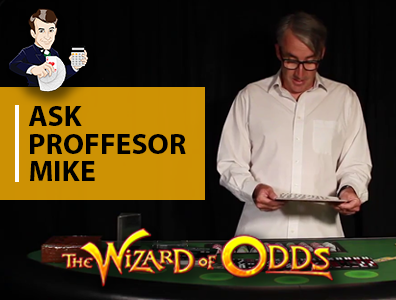
What's going on, Mike?
[00:12:48] Mike: Professor, that is a very good question, and one I have been trying to get the answer to for years. These casino rule books don't help at all because they disagree with each other.
The way most of them put it is that the 2-4 tile outranks the mixed five pair, and all of them outrank the 1-2 Gee tile. However, Harrah's Lake Tahoe here, lists both Gee tiles as being beneath the mixed five pair, and the Palace Station list both Gee tiles as being above the mixed five pair.
What is really going on here?
To answer the question, let me quote Michael Musante's book, Pai Tiles, here, which I highly recommend for beginners.
On page 30, he addresses this confusion in a note at the bottom. It reads, the two tiles that make the highest pair Gee Joon, or the lowest when played separately. The 2-4 tile is listed as being ranked higher than the 2-3, 1-4, and 1-2 tiles. When the 2-4 tile is played as a three, it takes the ranking of the 1-2 tile.
Any tile that is played with the 2-4 or 1-2 will have a higher ranking. What he means is that when you count this 2-4 Gee tile as three points, which you're allowed to do, from my video on the rules of Pai Gow, then it becomes equally ranked to the bottom tile, the lowest ranked tile, the 1-2 Gee.
Does this ever make any difference?
You might ask. The answer is no. The only situations where you would want this to count as six instead of three, is with the following tiles. The 12, the 2, the 10, or the 11. Note how all of these are ranked in the top eight.
We have the highest, second highest, fifth highest, and eighth highest ranked tiles. If you combine this with any one of them, for example, this or this or this or this, the other tile is going to outrank it, whether it's above or below the mixed five pair.
Therefore, and as you remember from my video on the rules:
Only the highest ranking tile matters in breaking a tie, the second highest does not matter. Therefore, I submit for your consideration, that when we talk about the rules of Pai Gow, we quit saying that this outranks the mixed five pair when counted as six because it never matters, it's never pertinent, it's moot.
From now on, can we all agree and just say that individually…
…that these are the lowest ranked tiles? I would like to commend Harrah's Lake Tahoe, for getting it right. I think all the other casinos are confused.
[00:16:19] Marvel: I have a question about the house way. Every house way that I've read says that you break up the Teen or Day pair to make 6-8 or better.
How would the house set this hand?
It has the Teen pair, a six, and a Gee. If this seems to qualify under that rule, if you break up the pair, then you can make 8-8, which is 6-8 or better. Nevertheless, if you kept the pair together, which seems the obvious thing to do, you can make pair nine.
What would the casino actually do with this hand?
[00:17:04] Mike: That's a good question. To rephrase it, the question is, how would the house play this hand here? Any casino house way book, like this one for example, even though this Foxwoods house way, which is 30 pages long, it doesn't specifically address this kind of situation, it does say that you're going to break up the Teen or Day pairs to make 6-8 or better, which you can in this situation.
Look here
We can make 8-8, but this would make absolutely no sense to play it this way because if you play it this way, you can play the Teen pair with a nine, which outranks 8-8 both ways. We would make absolutely no sense to play this one by the book.
By what official rule in Pai Gow do you play it this way?
I have asked a lot of people this, many, many dealers, and they all say that there is basically an unwritten rule in Pai Gow, that if there's one best way to play the hand where both the high and the low outrank any alternative way to play it, then that's what you do. I guess it's so obvious that they don't even put it in writing.
This rule, of course, applies to players as well. Yes, that's all I have to say. This is what I call the unwritten rule of Pai Gow. If one setting is superior in both high and the low to everything else, then that's what you do.
[00:18:52] Marvel: Mike, I love your website about Pai Gow, but are there any good books about the game?
[00:18:59] Mike: Thanks, professor, I'm glad you asked. This book here, Pai Gow Tiles, by Michael Musante, I highly recommend.
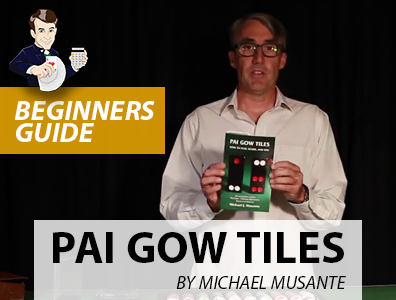
Especially for beginners
It's written in very simple English, with lots of diagrams, it assumes no prior knowledge about the game, it goes through another story to help you memorize the orders of the pairs. It's different from my story, and it goes through some basic strategy tips, as well as all the rules, and just some fun facts about the game.
Again, if you're just getting started with Pai Gow, in my opinion, this is the only good book addressed to beginners for the game.
Now
If you're a little bit more advanced, there's this book here, Finding the Edge, that has a whole bunch of different articles about gambling. All kinds of different games, and they're all very high level. One of them is titled, A Detailed Study of Pai Gow, by the late John Gwynn.
It is 63 pages that goes through different strategies of the game, different house ways, the optimal strategy, and comparing a single optimal strategy, whether there's different ones, whether you're banking or not banking, just subtle differences in the house edge according to what house way you use. I believe it also touches on seeing one of the dealer's tiles, and very esoteric topics like that.
If you really want to know…
…just about everything there is about the game from a mathematical sense, I think that this book deserves to be on your shelf, it has lots of other interesting articles, as well as if you're kind of a math wonk about casino games as I am. Now, this one here, you're really unlikely to find.
This is just called, How to Play Pai Gow, and it is by George Allen. When was this published? I think 1985, yes. Copyright 1985, and it's in this old font that you only see in old books like this, especially of a mathematical nature.
It's quite short, it's only 28 pages, and it goes through the rules and just some rudimentary strategy advice. I think that strategy for the game has come a long way since this was written. Nevertheless, if you just like collecting gambling books, especially in Pai Gow, in the unlikely chance you ever find it anywhere, it's an interesting thing to have to your collection.
Finally, if you're interested in Pai Gow more from the dealer side of the table, in terms of the way they cut the tiles and deal them and with the dice and all this procedure that players don't really need to care about, this booklet here, Pai Gow Without Tears, by Bill Zender, is shall we say, the Bible of Pai Gow for casinos.
It starts with just the general rules, and then it goes through all these different cuts you can do, how to correct for errors, and things like that. It doesn't get into player strategy at all, but it does list a very rudimentary house way.
Frankly, if I ran a casino
I would use a very simple house way. These really complicated ones, full of exceptions, really don't increase the house edge for the casino very much. Again, for the procedures of the game, nothing else can compare to this book.
As far as I know, that's all that I know that is in print about Pai Gow, other than a small booklet that was a ripoff of stuff from my site, which I won't even say the name of. Until I write my own book, that's what there is.
[00:23:45] Marvel: Mike, when I was playing Pai Gow, the dealer asked me if I wanted to bet an extra 10% when I banked, and I didn't know that this was allowed.
Do all casinos allow this, and do you recommend it?
[00:23:58] Mike: Good question, and another very pertinent one. Some casinos do allow you to bet an extra 10% when you're banking, compared to how much you bet the last time you bet when the dealer was banking.
For example:
If you bet a thousand dollars the last time the dealer was banking, you can now bet $1100 when it's your turn to bank. As you know, the house advantage when you're banking, is much less. I highly recommend that you get as much of your action as you can, as the banker, as opposed to when you're not banking.
Doing so, invoking this rule, will lower the house advantage by 0.04%.
[00:24:50] Marvel: Mike, why no side bets in Pai Gow?
[00:24:53] Mike: Pai Gow seems to be just about the last game in the casino that hasn't been contaminated with side bets yet. Nevertheless, it isn't totally free of them, I have seen a couple of them.
One of them is called Pair Fortunes, which you can find at the Palace Station, it carries a house advantage of 5.30%. The other one is called Bonanza, you can find that at the Crown Casino in Melbourne, Australia. That one carries a house advantage of 9.61%. The full pay tables for both of them can be found on my website, Wizard of Odds.
[00:25:32] Marvel: Mike, I've noticed that Pai Gow is kind of a difficult game to find sometimes. Where can I actually find a casino that has Pai Gow?
[00:25:42] Mike: Yes, I feel your pain on that. Pai Gow can be a difficult game to find sometimes. Sometimes I'm a captive audience in a casino, and they don't have Pai Gow, which is unfortunate.
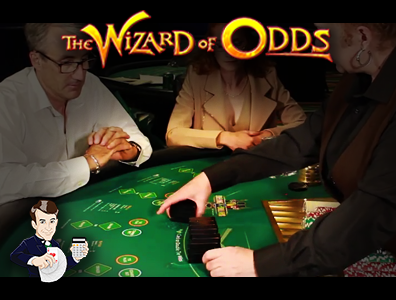
Nevertheless
Pai Gow is not difficult to find here in Las Vegas. Casinos that still have it are the MGM Grand, the Paris, Harrah's, The Venetian, The Palazzo, the Wynn, the Encore, Caesars Palace, The Mirage, the Bellagio, the Aria, the Palace Station, and the Lucky Dragon, and the Rio.
Hopefully, I'm not forgetting any. It's also really easy to find in Atlantic City. Every casino there will probably have three to five tables.
In the middle of the country, it's more difficult to find. I hear that some of the casinos near Chicago have it. Surprisingly, in Macau, it's really difficult to find. Unless you speak Chinese, I would recommend against playing it there.
They, shall we say, play it differently there, with-- Once when I played there, it's a long story, but the other players got mad at me because I was actually looking at the tiles. They played it where they just felt them with their fingers.
Again, it's strange b
But it's-- Macau, as far as I know, only has two tables of the game. Where else? I've seen it at The Star Casino in Sydney, Australia, and Europe, I had never seen it, South America, never seen it, Central America, never seen it. The number of tables in Las Vegas is decreasing.
The Treasure Island yanked it out, the Mandalay yanked it out. Yes, that's about as much as I know about where you can find Pai Gow.
[00:27:53] Marvel: Mike, I keep hearing about the house way in Pai Gow, is there just one house way or does each casino have a different one?
[00:28:01] Mike: I happen to have about 10 different house ways in my filing cabinet. I've looked at them, and I would say that in at least 95% of situations, every casino would play it the same way. However, every different house way I've seen, has long lists of exceptions. For example, we play a nine before a Gong, in general.
However
We play the Gong in these long lists of situations, in my opinion, casino house ways are way more complicated than they need to be. I've analyzed Pai Gow to death, and I can tell you that adding a long list of exceptions really does not increase the house advantage by hardly at all for them. In some case, it actually lowers it with a bad exception.
Also, to be honest with you…
…I'm a little bit skeptical. In fact, I'm more than a little bit. I'm very skeptical that any given dealer in any casino is actually playing that casino's official house way. A lot of dealers go from job to job as they try to advance through their career.
Let's say...
...that they were trained in the house way at the Paris, and then they get a job at The Mirage. I doubt that The Mirage is going to hand that dealer something in writing that said, "Here's our house way, learn it." No, I think they will just throw them out on the floor, and it'll be perfectly fine with The Mirage if that dealer follows the Paris house way. They'll never admit that, but I think that that's what would happen.
One reason
I think this, is that it's happened to me several times, where the dealer set the hand one way, and then the foreman will come over and reset it another way, and say, "No, that's how we set this hand here."
I find this fishy…
…because whenever the dealer's hand gets reset, it always seems to work against the player. Either turning a win to a push or a push to a loss. Yes, to answer your question, they're more or less the same, based on what's called the Musante house way. Each one has their own list of obscure exceptions.
[00:30:35] Marvel: Mike, I know you say to bank whenever you can, for as much as you can. I've tried to follow this in the casino, but sometimes other players, especially Asian players, don't like it when I bank.
A frequent comment made is that, "Hey, this table has been running good, don’t mess it up by banking." My question to you is, what do you do when it's your turn to bank and you're facing resistance from other players?
[00:31:07] Mike: That's a good question. I too have faced a lot of hostility at the Pai Gow table, over banking etiquette. I will not bank if I feel that it's going to be unpleasant for the playing experience. Not just for myself, but the other players as well.
As I've said many times:
That gambling should be thought of as a form of recreation. I don't think that it's a good thing to take what should be something that's fun, and turning it into an argument at the table between the other players. Every situation is different, but if I want to bank, and if the table is full of Asian players who are betting a lot of money, I'm not even going to ask about it.
I'm going to accept my role…
…as the little guy in the table, and defer to them and how they want to play the game. However, if there are not so many other players, and they're betting small, and it seems like they're just recreational and having a good time with the game, I'll ask, "Do you mind if I bank?"If they say, "No, I don't mind. I think I'll sit out this hand." "Sure, then I'll do it."
If they seem apprehensive about it, and say something like, "Well, the table has been running good. I know you have the right to bank, but I would prefer you didn’t." Then I won't.
Again
Every situation is different. You have to weigh that lower house advantage of banking, against any ill-will you may cause at the table. How you decide to handle that, you're just going to have to decide that for yourself. I hope that my comments will be of some help.
[00:33:09] Marvel: Mike, you talk an awful lot about Pai Gow. Why do you like the game so much? It seems like there's better bets available in the casino in Blackjack and Craps?
[00:33:18] Mike: Yes, that's true that I do write a lot about Pai Gow. When people come to visit me in Las Vegas and they want to go to the casino, I'm always suggesting we play Pai Gow.
Why do I like this game so much?
Especially when the house advantage is less than in Blackjack and Craps? The reason is, I think that Pai Gow is the most intellectually challenging game in the casino. I think that there is very few players on earth that know the optimal strategy for the game.
No matter how good you get at it, if you're not perfect, you will encounter hands that you won’t be sure what is the correct mathematical way to play. I like being put to that test.
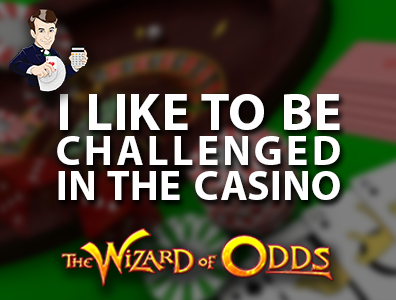
I like to be challenged in the casino
It's not just the experience at the table, in terms of analytical point of view. It's a very interesting game to try to come up with strategies for, and to analyze. I'm also rather proud of myself that I think I've gone a long way to integrating Pai Gow.
When I first started to try to just find out the rules for the game, when I lived in Baltimore, it was not easy. The casinos there simply did not have anything that stated the rules, especially in English. I never once saw a non-Asian player playing it there, and I went to Atlantic City a lot. Finally, the Trump Plaza kindly gave me their house way to the game.
I caught them on a slow night, the floor man there was very patient with me about answering my many questions about the rules. He also gave me a rule booklet. That was a great example of customer service by the way, to help someone who wasn't even playing, trying to understand the rules of the game.
I'd like to thank the Trump Plaza for that, put in a good word for them, even though they're out of business now. Yes, where was I going with all this? If I'm in a casino, and I'm just playing for fun, I'm not playing for points or anything like that, I'm just going to bet small and play what I like.
Pai Gow is what I like. If it cost me an extra dollar in lost expected value per hour, I'm willing to pay that dollar to play a game that I enjoy more.


